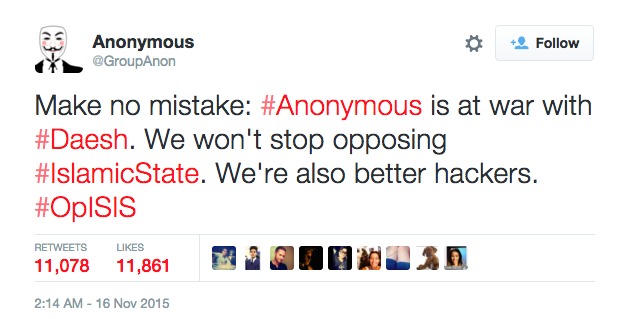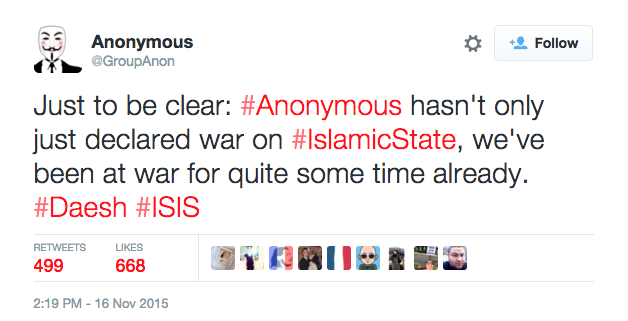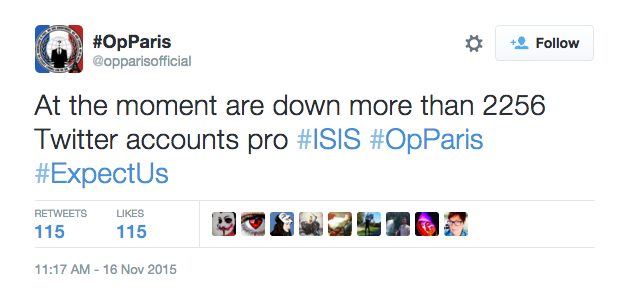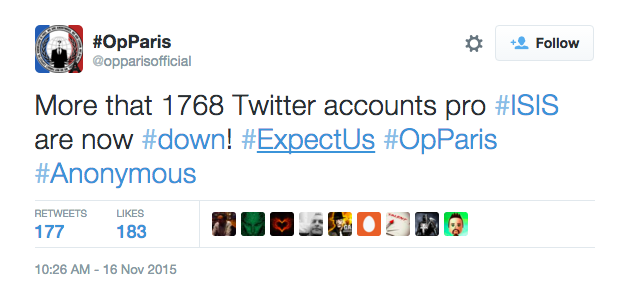Anonymous Vs. ISIS: How Effective Are Cyber Attacks Against Terrorist Threats?
The hacker activist group announced plans for its "biggest operation" yet against the extremist militant group following the terrorist attacks on Paris last week.
Following the series of coordinated terrorist attacks in Paris on 13 November, hacktivist group Anonymous has announced an all-out cyberwar against the Islamic State (IS), commonly known as ISIS
IS, also referred to as ISIS (Islamic State of Iraq and Syria) or ISIL (Islamic State of Iraq and the Levant), had claimed responsibility for the attacks that killed 129 civilians and wounded close to 450 people.
In retaliation, Prime Minister Manuel Valls confirmed on 16 November that French authorities have conducted more than 150 raids and completed a bombing campaign against suspected IS camps in Syria.
In a YouTube video released on 14 November, a masked self-identified member of the group declared war against IS, saying that they are preparing to launch their "biggest operation" against the extremist militant group
"These attacks cannot remain unpunished," the man said, speaking in French.
"We are going to launch the biggest operation ever against you. Expect many cyberattacks. War has been declared. Get ready. We don't forgive and we don't forget," he added, without giving details of what the attacks would involve.
Made up of an unknown number of loosely-connected individuals, Anonymous is an international network of activist computer hackers who have claimed responsibility for numerous cyberattacks against governments as well as corporate and religious websites for more than a decade
Having gained notoriety in 2008 following its cyberattack on the Church of Scientology, Anonymous has been known to level its ire against those it perceives to be ethically and morally corrupt.
Some of the group's most famous targets include the white supremacist group Ku Klux Klan, the Westboro Baptist Church (known for its hate speech against the LGBT community, Jews, and liberal politicians), the Vatican, and even the CIA.
Anonymous' targets also include governments, such as Tunisia in 2011, in response to reports of censorship during the Arab Spring uprisings. Last year, the group was reported to have launched attacks that on the city of Ferguson, Missouri after the fatal shooting of Michael Brown, taking down e-mail servers and the phone system.
This is not the first time Anonymous has declared war against ISIS.
Following the Charlie Hebdo attacks in January, the hacker group waged an online vigilante campaign that attacked extremist donation websites and forced the shutdown of more than 25,000 Twitter profiles suspected to have belonged to ISIS supporters
The group says it has identified more than 39,000 suspected ISIS profiles and reported them to Twitter. It claims to have had more than 25,000 of these accounts suspended, while nearly 14,000 more on the targeted list remain active, according to a list posted to a site calling itself Lucky Troll Club.
Now, how effective can a virtual declaration of war be in taking down a militant group that is active? According to cyberwarfare expert David Gewirtz, cyberattacks may not be able to "take terrorists off the field", but it can cause a huge disruption in the terrorists' operations.
"Cyberattacks can have a tremendous impact," cyberwarfare expert David Gewirtz told CBS News.
"Of course, they can't be used to arrest people or take terrorists off the field, but they can certainly be used to compromise structural components of terrorist operations. More to the point, they can go after both the money that terrorists have and their funding sources. Damaging the money flow can certainly have an impact on the terrorists' operations."
Anonymous' cyberwarfare would most likely involve taking over and/or outright hacking of ISIS-affiliated websites and social media platforms, as these are the militant group's main recruitment channels
There are a variety of ways that hackers can take over social media accounts, from social engineering (calling Twitter/Facebook/etc. and pretending to be the account's owner) to side doors (using password retrieval of separate, connected accounts to access social media accounts).
Anonymous’ official Twitter area for Operation Paris has already reported that “more than 3,824 Twitter accounts pro-ISIS are now down,” a number that has been steadily climbing.
Besides social media takeovers, one of the hacker collective's possible modus operandi would be shutting down websites affiliated with its targets using a form of attack called "distributed denial of service" (DDoS)
A "DDoS" attack is a way of flooding a computer system with far more requests for information than it can handle, thus shutting it down altogether. Hackers, employing massive quantities of "virtual" machines — programs acting as full-on computers — request data en masse from a network. When that network is overrun with requests, it shuts down, making it unusable for everyone.
Anonymous has successfully used this method in the past for shutting down the computer networks of companies or organizations it deems fit for attack, from The Church of Scientology to the municipal computer system of Ferguson, Missouri (in the wake of the shooting death of Michael Brown).
Seeing as ISIS' operations primarily rely on donations from their supporters, shutting down their propaganda and donation site in the Dark Web would greatly cripple their major financial sources and hence, their operations
Mostly, ISIS relies on small donations from supporters, after they’ve been indoctrinated. The Anonymous campaign can be effective in this area in two ways.
First, by repeatedly shutting down huge numbers of donation sites, Anonymous will make it far harder for people who want to donate to do so.
Second, by shutting down propaganda sites, it can reduce the number of people who feel the desire to donate. Anonymous shutdowns will make it far harder to get those messages out and for anyone who does see such messages to respond.
If Anonymous can keep ahead of ISIS in shutting down propaganda, recruitment and fundraising sites and feeds of all kinds, its cyberwar - in conjunction with standard military attacks - can work.
Another possible course of action would be for Anonymous to outright access ISIS' private networks in retrieving battle plans, operative names, and other vital info that could assist in military action, as well as to release personal information about members of ISIS
There's no doubt that world governments are already attempting this themselves, though a hacking collective with a bone to pick may apply methods that are outside of what world governments (and international laws) consider respectable behavior. This is the kind of information-based warfare that hacking collectives specialize in, which has ripple effects beyond the act itself.
Discernible effects from Anonymous' campaign against ISIS remains to be seen, although the militant group is reported to have taken precautions against possible cyber attacks from the "idiots"
A Telegram channel that’s believed to be affiliated with ISIS hackers sent out a message to its followers instructing them how to prevent getting hacked by Anonymous.
“The #Anonymous hackers threatened in new video release that they will carry out a major hack operation on the Islamic state (idiots),” the statement read in part.
The message goes on to provide “instructions” on how to avoid potential hacks: Don’t open any links unless sure of the source. Change Internet Protocol addresses “constantly.” And “do not talk to people [you] don’t know on Telegram” or through Twitter direct messaging.
The message was then forwarded around to various other ISIS-affiliated Telegram channels.









